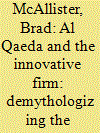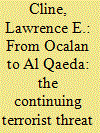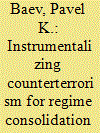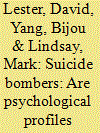| Srl | Item |
| 1 |
ID:
052395


|
|
|
|
|
| Publication |
Jul-Aug 2004.
|
| Summary/Abstract |
This piece attempts to add to the discourse on violent substate political activism by underscoring certain overlooked elements in the study of groups such as Al Qaeda as it relates to organizational paradigms. Specifically, this essay sheds light on the nature of networks in the business world and the ways in which firms utilize organization as a method of creating value. This article starts with the assumption that the end of firm organization is ultimately the maximization of innovative capacity. The conclusion of this essay finds that Al Qaeda's use of networks has not created the indestructible conglomerate many students of terrorism fear, but rather that the resort by Al Qaeda to an all-channel network was the result of poor strategy and indeterminate political goals that have robbed it of much of its effectiveness. This study uses cursory examinations of several other similar organizations to underscore the difference in strategy and firm innovation between firms considered to have high added-value and Al Qaeda.
|
|
|
|
|
|
|
|
|
|
|
|
|
|
|
|
| 2 |
ID:
052396


|
|
|
|
|
| Publication |
Jul-Aug 2004.
|
| Summary/Abstract |
The most recent terrorist attacks in Turkey suggest a new phase in the country's war against terrorist groups. Although the PKK has largely been neutralized as a major threat to internal stability, the continued existence of other militant organizations--particularly Islamist groups who appear to be cooperating with elements of al Qaida--suggests continued security problems for the government.
|
|
|
|
|
|
|
|
|
|
|
|
|
|
|
|
| 3 |
ID:
052397


|
|
|
|
|
| Publication |
Jul-Aug 2004.
|
| Summary/Abstract |
Since the late 1990s, Russia has been among the countries most painfully affected by terrorism and President Putin has shown little doubt and even much enthusiasm in joining the U.S.-led "war" against terrorism. Intertwined as they are, counterterrorism and Chechnya are still significantly different matters in Russian security policy, and this article aims at examining how the struggle against terrorism shapes essential features of Russia's foreign and domestic policies during Putin's first presidency. Internally, the struggle against terrorism provides for a sufficient mobilization of the dysfunctional society around the "mutant" regime that has consolidated its control over mid-term political agenda. Internationally, high-profile counterterrorism strategy has helped Russia to secure for itself a more prominent role than the sheer size of its "assets" would justify. This war is fundamentally not about victory; it is about many "collateral" benefits for the regime that Putin is presiding over.
|
|
|
|
|
|
|
|
|
|
|
|
|
|
|
|
| 4 |
ID:
052394


|
|
|
|
|
| Publication |
Jul-Aug 2004.
|
| Summary/Abstract |
Research on the characteristics of suicide bombers is reviewed. Contrary to previous commentary, it is suggested that suicide bombers may share personality traits (such as the "authoritarian personality") that psychological profiles of suicide bombers might be feasible, and that the suicide bombers may be characterized by the risk factors that increase the probability of suicide.
|
|
|
|
|
|
|
|
|
|
|
|
|
|
|
|
| 5 |
ID:
052393


|
|
|
|
|
| Publication |
Jul-Aug 2004.
|
| Summary/Abstract |
This article examines the strategic utility of suicide terrorism. Suicide terrorism, we suggest, can be thought of as a form of strategic "signaling." We define terrorism as a signaling game in which terrorist attacks are used to communicate a group's character and objectives to a set of target audiences. This is followed by an examination of the utility of suicide attacks as a signaling tactic. The relative effectiveness of suicide operations is evaluated in relation to other tactical options that are traditionally available to terrorist organizations. We go on to examine the institutional and social context of suicide terrorism, concluding with an examination of the evolutionary use of suicide attacks by Palestinian terrorist organizations and the Liberation Tigers of Tamil Eelam.
|
|
|
|
|
|
|
|
|
|
|
|
|
|
|
|